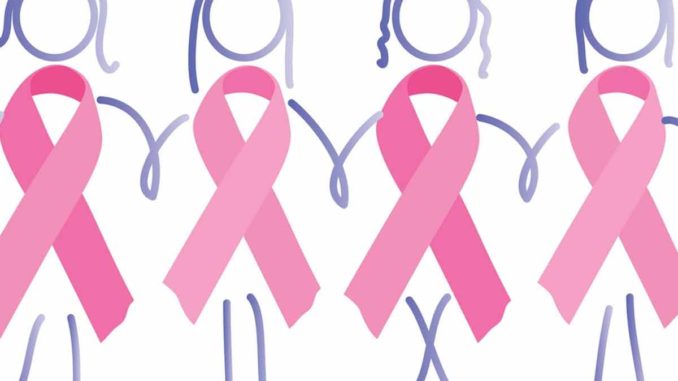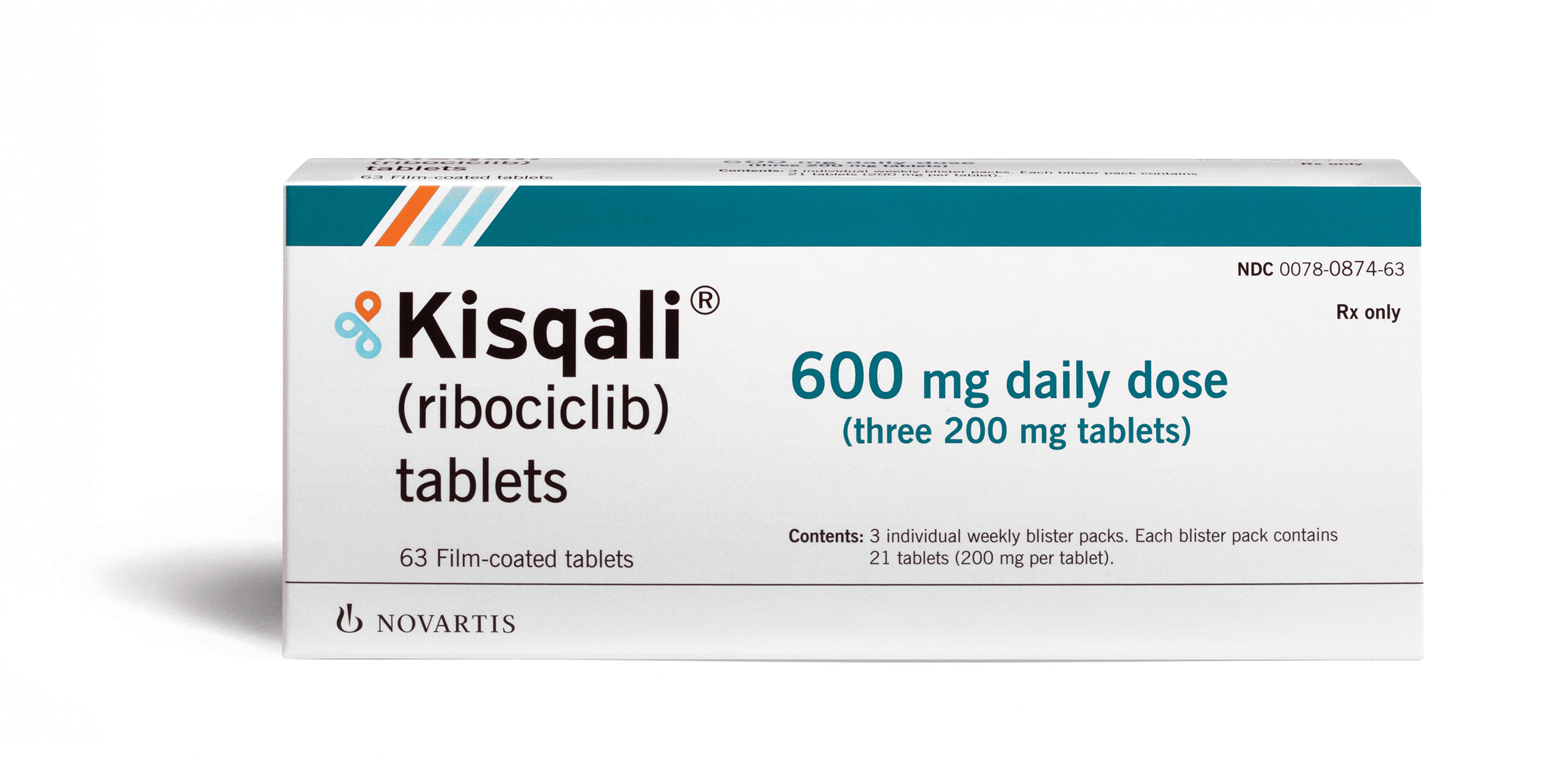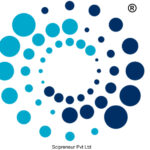
FDA Granted Breakthrough Therapy Designation to Novartis Kisqali®
Designation based on Phase III MONALEESA-7 results demonstrating superior efficacy of Kisqali in combination with oral endocrine therapy compared to oral endocrine therapy in pre- or perimenopausal women who received no prior endocrine therapy for advanced disease[1]
Designation based on Phase III MONALEESA-7 results demonstrating superior efficacy of Kisqali in combination with oral endocrine therapy compared to oral endocrine therapy in pre- or perimenopausal women who received no prior endocrine therapy for advanced disease[1]
Novartis announced Kisqali® (ribociclib) received US Food and Drug Administration (FDA) Breakthrough Therapy designation for initial endocrine-based treatment of pre- or perimenopausal women with hormone-receptor positive, human epidermal growth factor receptor-2 negative (HR+/HER2-) advanced or metastatic breast cancer in combination with tamoxifen or an aromatase inhibitor.
This Breakthrough Therapy designation is based on positive results of the Phase III MONALEESA-7 trial demonstrating Kisqali in combination with tamoxifen or an aromatase inhibitor as initial endocrine-based therapy significantly prolonged progression-free survival (PFS) compared to endocrine therapy alone (median PFS 23.8 (95% CI: 19.2 months-not reached) vs. 13.0 months (95% CI: 11.0-16.4 months); HR=0.553; 95% CI: 0.441-0.694; p<0.0001)[1]. A total of 672 women ranging from 25-58 years in age were enrolled and randomized in the trial[1]. All treatment combinations also included goserelin[1]. Treatment benefit with Kisqali combination therapy was consistent compared to the overall population regardless of treatment with tamoxifen or aromatase inhibitor endocrine partners, and across predefined patient subgroups[1].
Treatment benefit with Kisqali combination therapy was consistent compared to the overall population regardless of treatment with tamoxifen or aromatase inhibitor endocrine partners, and across patient subgroups[1]
Treatment benefit with Kisqali combination therapy was consistent compared to the overall population regardless of treatment with tamoxifen or aromatase inhibitor endocrine partners, and across patient subgroups[1]
“This Breakthrough Therapy designation reflects the significance and promise of the MONALEESA-7 data presented at SABCS last month,” said Samit Hirawat, MD, Head, Novartis Oncology Global Drug Development. “Younger women often have distinct treatment goals and needs, and it is important for oncologists to offer effective and well-studied treatment options for their specific disease. We look forward to working with FDA to make this combination therapy available to premenopausal women living with HR+/HER2- advanced breast cancer in the US as soon as possible.”
MONALEESA-7 was the first Phase III trial entirely dedicated to evaluating a CDK4/6 inhibitor in premenopausal women with HR+/HER2- advanced breast cancer. The trial evaluated Kisqali in combination with oral endocrine therapies (tamoxifen or an aromatase inhibitor) and goserelin compared to oral endocrine therapy and goserelin in this patient population. In subgroup analyses of median PFS by endocrine partner, Kisqali in combination with tamoxifen and goserelin demonstrated 22.1 months median PFS compared to 11.0 months for tamoxifen and goserelin alone; Kisqali in combination with an aromatase inhibitor and goserelin demonstrated 27.5 months median PFS compared to 13.8 months for an aromatase inhibitor and goserelin alone[1].

No new safety signals were observed in the MONALEESA-7 trial; adverse events were generally consistent with those observed in MONALEESA-2, identified early and mostly managed through dose interruptions or reductions[1]. Combination treatment with Kisqali was well tolerated with a discontinuation rate due to adverse events of 3.6% compared to 3.0% in patients who received endocrine therapy alone[1]. The most common (>=5%) grade 3/4 adverse events in patients receiving Kisqali combination therapy compared to endocrine therapy alone were neutropenia (60.6% vs 3.6%) and leukopenia (14.3% vs 1.2%)[1].
Premenopausal breast cancer is the leading cause of cancer death in women 20-59 years old underscoring the need for new treatment options[2]
Premenopausal breast cancer is the leading cause of cancer death in women 20-59 years old underscoring the need for new treatment options[2]
Premenopausal breast cancer is a biologically distinct and more aggressive disease than postmenopausal breast cancer, and it is the leading cause of cancer death in women 20-59 years old[2],[3].
According to FDA, Breakthrough Therapy designation is intended to expedite the development and review of potential new medicines that treat serious or life-threatening conditions, if the therapy has demonstrated substantial improvement over an available therapy on at least one clinically significant endpoint. The designation includes all of the Fast Track program features, as well as more intensive FDA guidance on an efficient drug development program[4].
This is the second Breakthrough Therapy designation granted to Kisqali for initial endocrine-based treatment in HR+/HER2- advanced or metastatic breast cancer
This is the second Breakthrough Therapy designation granted to Kisqali for initial endocrine-based treatment in HR+/HER2- advanced or metastatic breast cancer
This Breakthrough Therapy designation marks the second for Kisqali. The first Breakthrough Therapy designation for Kisqali was granted in August 2016 based on results of the Phase III MONALEESA-2 trial.
About MONALEESA-7
MONALEESA-7 is a Phase III randomized, double-blind, placebo-controlled trial investigating the efficacy and safety of Kisqali in combination with tamoxifen or a non-steroidal aromatase inhibitor plus goserelin versus tamoxifen or an aromatase inhibitor plus goserelin, in premenopausal or perimenopausal women with HR+/HER2- advanced breast cancer who had not previously received endocrine therapy for advanced disease. More than 670 women ranging from 25-58 years in age were randomized in the MONALEESA-7 trial.
About Kisqali® (ribociclib)
Kisqali is a selective cyclin-dependent kinase inhibitor, a class of drugs that help slow the progression of cancer by inhibiting two proteins called cyclin-dependent kinase 4 and 6 (CDK4/6). These proteins, when over-activated, can enable cancer cells to grow and divide too quickly. Targeting CDK4/6 with enhanced precision may play a role in ensuring that cancer cells do not continue to replicate uncontrollably.
Kisqali was approved by the European Commission in August 2017, as initial endocrine-based therapy for postmenopausal women with HR+/HER2- locally advanced or metastatic breast cancer in combination with an aromatase inhibitor based on findings from the pivotal MONALEESA-2 trial. Kisqali is not currently approved for use in premenopausal women.
Kisqali is approved for use in 45 countries around the world, including the United States and European Union member states. Kisqali was developed by the Novartis Institutes for BioMedical Research (NIBR) under a research collaboration with Astex Pharmaceuticals.
About Novartis in Advanced Breast Cancer
For more than 25 years, Novartis has been at the forefront of driving scientific advancements for breast cancer patients and improving clinical practice in collaboration with the global community. With one of the most diverse breast cancer pipelines and the largest number of breast cancer compounds in development, Novartis leads the industry in discovery of new therapies and combinations, especially in HR+ advanced breast cancer, the most common form of the disease.
Important Safety Information from the Kisqali EU SmPC
The most common ADRs and the most common grade 3/4 ADRs (reported at a frequency >=20% and >=2% respectively) for which the frequency for Kisqali plus letrozole exceeds the frequency for placebo plus letrozole were blood and lymphatic system disorders (including abnormally low neutrophil and white blood cell count), headache, back pain, nausea, fatigue, diarrhea, vomiting, constipation, hair loss and rash and abnormally low levels of neutrophils or white blood cells, abnormal liver function tests (increased alanine and aspartate aminotransferase), abnormally low lymphocyte count, low levels of phosphate, vomiting, nausea, fatigue and back pain, respectively. Low levels of neutrophils was the most commonly seen severe adverse event; fever in addition to a low neutrophil count was reported in 1.5% of patients.
Kisqali can cause serious side effects such as a significant decrease in neutrophil count, abnormal liver function tests and may have an effect on the electrical activity of the heart known as QT/QTc interval prolongation, which could lead to disturbances in heart rhythm. As a precaution, patients should have complete blood counts, liver function, and serum electrolyte levels measured prior to starting treatment as well as during treatment with Kisqali. Patients should also have their heart activity checked before and monitored during treatment.
The efficacy and safety of ribociclib have not been studied in patients with critical visceral disease.
The use of Kisqali with medicinal products known to prolong QTc interval or strong CYP3A4 inhibitors should be avoided as this may lead to prolongation of the QT/QTc interval. If treatment with a strong CYP3A4 inhibitor cannot be avoided, the Kisqali dose should be reduced. Concomitant administration with other medicines that could affect cardiac repolarization or prolong the QT/QTc interval should be taken into account prior to and during treatment with Kisqali. Patients taking sensitive CYP3A4 substrates with narrow therapeutic index should use caution because of the increased risk of adverse events that may occur if these medications are co-administered with Kisqali.
Kisqali contains soya lecithin and therefore it should not be taken by patients who are allergic to peanut or soya.
Animal studies suggest that Kisqali may cause fetal harm in pregnant women. Therefore, as a precaution, women of childbearing potential should use effective contraception while receiving Kisqali during treatment and up to 21 days after stopping treatment. Women should not breast feed for at least 21 days after the last dose of Kisqali. Kisqali may affect fertility in males.
Please see full Prescribing Information for Kisqali, available at www.kisqali.com.
Disclaimer
This press release contains forward-looking statements within the meaning of the United States Private Securities Litigation Reform Act of 1995. Forward-looking statements can generally be identified by words such as “potential,” “can,” “will,” “plan,” “expect,” “anticipate,” “look forward,” “believe,” “committed,” “investigational,” “pipeline,” “launch,” or similar terms, or by express or implied discussions regarding potential marketing approvals, new indications or labeling for the investigational or approved products described in this press release, or regarding potential future revenues from such products. You should not place undue reliance on these statements. Such forward-looking statements are based on our current beliefs and expectations regarding future events, and are subject to significant known and unknown risks and uncertainties. Should one or more of these risks or uncertainties materialize, or should underlying assumptions prove incorrect, actual results may vary materially from those set forth in the forward-looking statements. There can be no guarantee that the investigational or approved products described in this press release will be submitted or approved for sale or for any additional indications or labeling in any market, or at any particular time. Nor can there be any guarantee that such products will be commercially successful in the future. In particular, our expectations regarding such products could be affected by, among other things, the uncertainties inherent in research and development, including clinical trial results and additional analysis of existing clinical data; regulatory actions or delays or government regulation generally; our ability to obtain or maintain proprietary intellectual property protection; the particular prescribing preferences of physicians and patients; global trends toward health care cost containment, including government, payor and general public pricing and reimbursement pressures; general economic and industry conditions, including the effects of the persistently weak economic and financial environment in many countries; safety, quality or manufacturing issues, and other risks and factors referred to in Novartis AG’s current Form 20-F on file with the US Securities and Exchange Commission. Novartis is providing the information in this press release as of this date and does not undertake any obligation to update any forward-looking statements contained in this press release as a result of new information, future events or otherwise.
About Novartis
Novartis provides innovative healthcare solutions that address the evolving needs of patients and societies. Headquartered in Basel, Switzerland, Novartis offers a diversified portfolio to best meet these needs: innovative medicines, cost-saving generic and biosimilar pharmaceuticals and eye care. Novartis has leading positions globally in each of these areas. In 2016, the Group achieved net sales of USD 48.5 billion, while R&D throughout the Group amounted to approximately USD 9.0 billion. Novartis Group companies employ approximately 121,000 full-time-equivalent associates. Novartis products are sold in approximately 155 countries around the world. For more information, please visit http://www.novartis.com.
Novartis is on Twitter. Sign up to follow @Novartis at http://twitter.com/novartis and @NovartisCancer at https://twitter.com/
For Novartis multimedia content, please visit www.novartis.com/news/media-
For questions about the site or required registration, please contact media.relations@novartis.com
References
[1] Tripathy D, Sohn J, Im S, et al. First-line ribociclib or placebo combined with goserelin and tamoxifen or a non-steroidal aromatase inhibitor in premenopausal women with hormone receptor-positive, HER2-negative advanced breast cancer: results from the randomized Phase III MONALEESA-7 trial. Presented at the San Antonio Breast Cancer Symposium (SABCS), December 6, 2017, San Antonio, Texas (abstract#S2-05).
[2] World Health Organization. Women’s health fact sheet. September 2013. Available at http://www.who.int/
[3] Benz CC. Impact of aging on the biology of breast cancer. Crit Rev Oncol Hematol. 2008;66:65-74
[4] US Food and Drug Administration. Guidance for Industry Expedited Programs for Serious Conditions – Drugs and Biologics. http://www.fda.gov/downloads/
# # #
Novartis Media Relations
Central media line: +41 61 324 2200
E-mail: media.relations@novartis.com
|
Eric Althoff Novartis Global Media Relations +41 61 324 7999 (direct) +41 79 593 4202 (mobile) |
Rosemarie Yancosek Novartis Oncology Communications +1 862 778 9043 (direct) +1 862 505 9021 (mobile) |
Novartis Investor Relations
Central investor relations line: +41 61 324 7944
E-mail: investor.relations@novartis.
|
Central |
|
North America |
|
|
Samir Shah |
Richard Pulik |
||
|
Pierre-Michel Bringer |
Cory Twining |
||
|
Thomas Hungerbuehler |
|
|
|
|
Isabella Zinck |
|
|







Leave a Reply